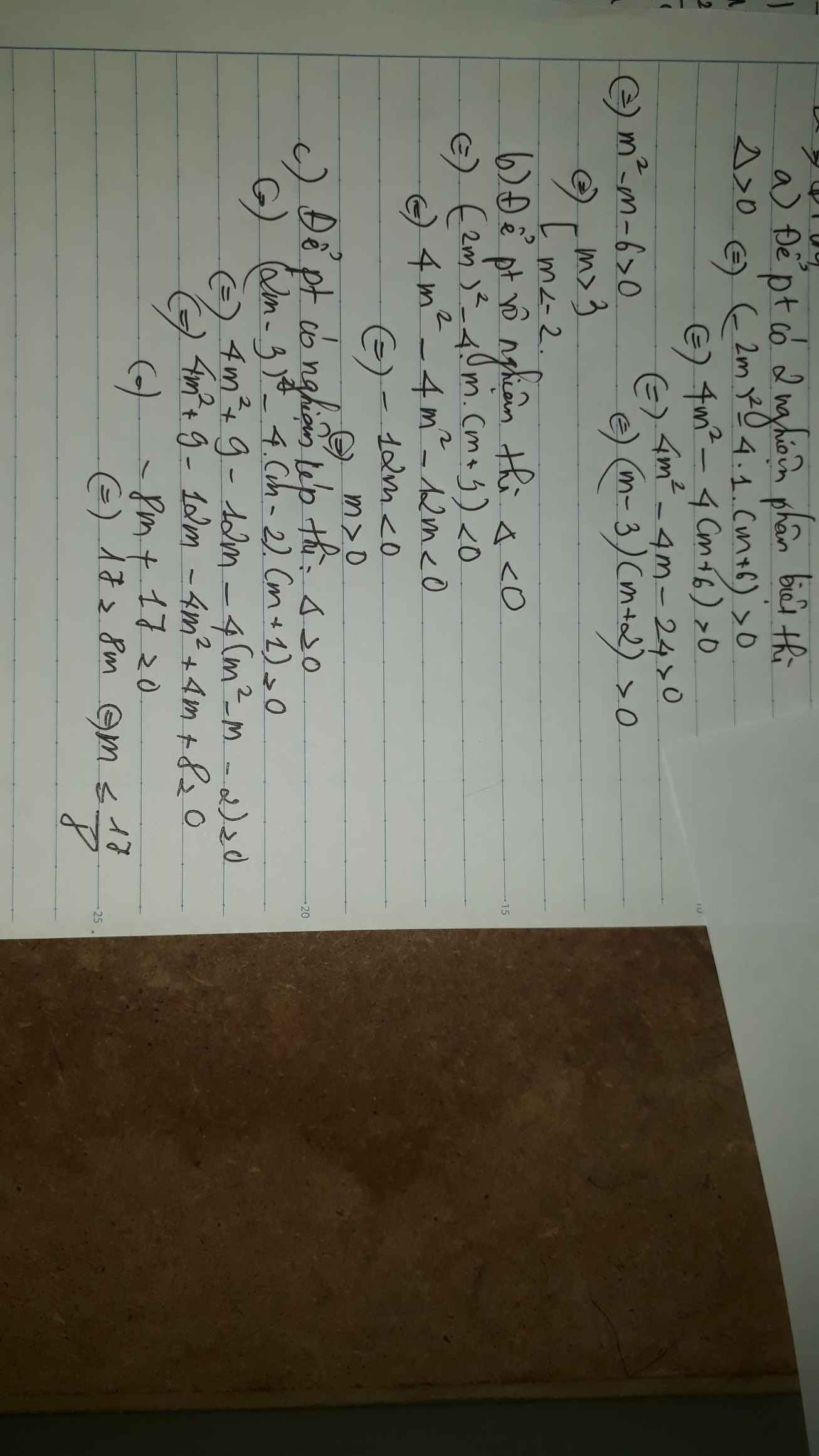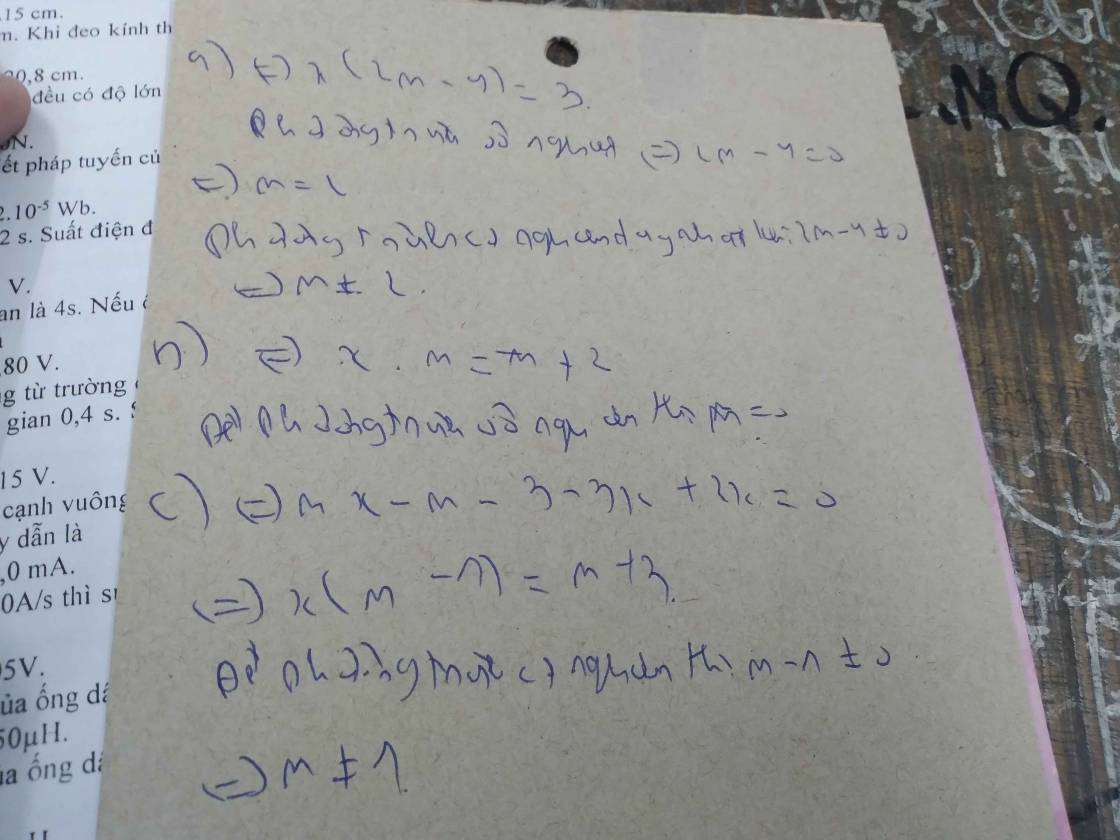Tìm m để phương trình:
a) x^2 – 2mx + m + 6 = 0 có hai nghiệm phân biệt.
b) mx^2 – 2mx + m + 3 = 0 vô nghiệm.
c) (m – 2)x^2 + (2m – 3)x + m +1 = 0 có nghiệm kép
Hãy nhập câu hỏi của bạn vào đây, nếu là tài khoản VIP, bạn sẽ được ưu tiên trả lời.

a: Ta có: \(\text{Δ}=\left(-2m\right)^2-4\cdot1\cdot\left(m+6\right)\)
\(=4m^2-4m-24\)
\(=4\left(m^2-m-6\right)\)
Để phương trình có hai nghiệm phân biệt thì Δ>0
\(\Leftrightarrow m^2-m-6>0\)
\(\Leftrightarrow\left(m-3\right)\left(m+2\right)>0\)
\(\Leftrightarrow\left[{}\begin{matrix}m>3\\m< -2\end{matrix}\right.\)
b: Ta có: \(\text{Δ}=\left(-2m\right)^2-4\cdot m\cdot\left(m+3\right)\)
\(=4m^2-4m^2-12m\)
=-12m
Để phương trình vô nghiệm thì Δ<0
hay m>0
c: Ta có: \(\text{Δ}=\left(2m-3\right)^2-4\left(m-2\right)\left(m+1\right)\)
\(=4m^2-12m+9-4\left(m^2-m-2\right)\)
\(=4m^2-12m+9-4m^2+4m+8\)
\(=-8m+17\)
Để phương trình có nghiệm kép thì Δ=0
hay \(m=\dfrac{17}{8}\)

Bài 2:
a: TH1: m=0
=>-x+1=0
=>x=-1(nhận)
TH2: m<>0
\(\text{Δ}=\left(m-1\right)^2-4m\left(1-m\right)\)
=m^2-2m+1-4m+4m^2
=5m^2-6m+1
=(2m-1)(3m-1)
Để phương trình có nghiệm thì (2m-1)(3m-1)>=0
=>m>=1/2 hoặc m<=1/3
b: Để phương trình có hai nghiệm phân biệt thì (2m-1)(3m-1)>0
=>m>1/2 hoặc m<1/3
c: Để phương trình có hai nghiệmtrái dấu thì (1-m)*m<0
=>m(m-1)>0
=>m>1 hoặc m<0
d: Để phương trình có hai nghiệm dương phân biệt thì
\(\left\{{}\begin{matrix}m\in\left(-\infty;\dfrac{1}{3}\right)\cup\left(\dfrac{1}{2};+\infty\right)\\\dfrac{-m+1}{m}>0\\\dfrac{1-m}{m}>0\end{matrix}\right.\Leftrightarrow\left\{{}\begin{matrix}m\in\left(-\infty;\dfrac{1}{3}\right)\cup\left(\dfrac{1}{2};+\infty\right)\\0< m< 1\end{matrix}\right.\)
=>1/2<m<1

d: Ta có: \(\text{Δ}=\left(m+1\right)^2-4\cdot2\cdot\left(m+3\right)\)
\(=m^2+2m+1-8m-24\)
\(=m^2-6m-23\)
\(=m^2-6m+9-32\)
\(=\left(m-3\right)^2-32\)
Để phương trình có hai nghiệm phân biệt thì \(\left(m-3\right)^2>32\)
\(\Leftrightarrow\left[{}\begin{matrix}m-3>4\sqrt{2}\\m-3< -4\sqrt{2}\end{matrix}\right.\Leftrightarrow\left[{}\begin{matrix}m>4\sqrt{2}+3\\m< -4\sqrt{2}+3\end{matrix}\right.\)
Áp dụng hệ thức Vi-et, ta được:
\(\left\{{}\begin{matrix}x_1+x_2=\dfrac{m+1}{2}\\x_1x_2=\dfrac{m+3}{2}\end{matrix}\right.\)
Ta có: \(\left\{{}\begin{matrix}x_1+x_2=\dfrac{m+1}{2}\\x_1-x_2=1\end{matrix}\right.\Leftrightarrow\left\{{}\begin{matrix}2x_1=\dfrac{m+3}{2}\\x_2=x_1-1\end{matrix}\right.\)
\(\Leftrightarrow\left\{{}\begin{matrix}x_1=\dfrac{m+3}{4}\\x_2=\dfrac{m+3}{4}-\dfrac{4}{4}=\dfrac{m-1}{4}\end{matrix}\right.\)
Ta có: \(x_1x_2=\dfrac{m+3}{2}\)
\(\Leftrightarrow\dfrac{\left(m+3\right)\left(m-1\right)}{16}=\dfrac{m+3}{2}\)
\(\Leftrightarrow\left(m+3\right)\left(m-1\right)=8\left(m+3\right)\)
\(\Leftrightarrow\left(m+3\right)\left(m-9\right)=0\)
\(\Leftrightarrow\left[{}\begin{matrix}m=-3\\m=9\end{matrix}\right.\)

\(a,x^2-\left(2m-3\right)x+m^2=0-vô-ngo\)
\(\Leftrightarrow\Delta< 0\Leftrightarrow[-\left(2m-3\right)]^2-4m^2< 0\Leftrightarrow m>\dfrac{3}{4}\)
\(b,\left(m-1\right)x^2-2mx+m-2=0\)
\(m-1=0\Leftrightarrow m=1\Rightarrow-2x-1=0\Leftrightarrow x=-0,5\left(ktm\right)\)
\(m-1\ne0\Leftrightarrow m\ne1\Rightarrow\Delta'< 0\Leftrightarrow\left(-m\right)^2-\left(m-2\right)\left(m-1\right)< 0\Leftrightarrow m< \dfrac{2}{3}\)
\(c,\left(2-m\right)x^2-2\left(m+1\right)x+4-m=0\)
\(2-m=0\Leftrightarrow m=2\Rightarrow-6x+2=0\Leftrightarrow x=\dfrac{1}{3}\left(ktm\right)\)
\(2-m\ne0\Leftrightarrow m\ne2\Rightarrow\Delta'< 0\Leftrightarrow[-\left(m+1\right)]^2-\left(4-m\right)\left(2-m\right)< 0\Leftrightarrow m< \dfrac{7}{8}\)

Đặt \(x^2=t\) phương trình trở thành:
\(t^2-2\left(m+1\right)t+m-2=0\) (1)
a. Phương trình có 4 nghiệm pb khi và chỉ khi (1) có 2 nghiệm dương pb
\(\Leftrightarrow\left\{{}\begin{matrix}\Delta'=\left(m+1\right)^2-\left(m-2\right)>0\\t_1+t_2=2\left(m+1\right)>0\\t_1t_2=m-2>0\end{matrix}\right.\) \(\Leftrightarrow\left\{{}\begin{matrix}m^2+m+3>0\left(\text{luôn đúng}\right)\\m>-1\\m>2\end{matrix}\right.\)
\(\Rightarrow m>2\)
b. Do \(\Delta'=m^2+m+3>0;\forall m\) nên pt đã cho vô nghiệm khi (1) có 2 nghiệm pb đều âm
\(\Rightarrow\left\{{}\begin{matrix}t_1+t_2=2\left(m+1\right)< 0\\t_1t_2=m-2>0\end{matrix}\right.\)
\(\Rightarrow\left\{{}\begin{matrix}m< -1\\m>2\end{matrix}\right.\) \(\Rightarrow\) không tồn tại m thỏa mãn
c. Pt có đúng 2 nghiệm khi (1) có 2 nghiệm trái dấu
\(\Leftrightarrow t_1t_2=m-2< 0\Rightarrow m< 2\)


a, Để pt có 2 nghiệm pb khi \(\Delta>0\)
\(\Delta=\left(-2m\right)^2-4\left(m+6\right)=4m^2-4m-24>0\Leftrightarrow m< -2;m>3\)
b, Để pt trên là pt bậc 2 khi \(m\ne0\)
Để pt vô nghiệm khi \(\Delta< 0\)
\(\Delta=4m^2-4m\left(m+3\right)=4m^2-4m^2-12m< 0\Leftrightarrow-12m< 0\Leftrightarrow m>0\)
c, Để pt trên là pt bậc 2 khi \(m\ne2\)
Để pt trên có nghiệm kép \(\Delta=0\)
\(\Delta=\left(2m-3\right)^2-4\left(m+1\right)\left(m-2\right)=4m^2-12m+9-4\left(m^2-m-2\right)\)
\(=-8m+17=0\Leftrightarrow m=\frac{17}{8}\)